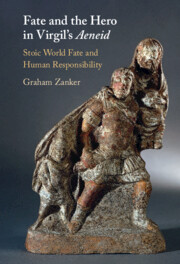Book contents
- Fate and the Hero in Virgil’s Aeneid
- Fate and the Hero in Virgil’s Aeneid
- Copyright page
- Dedication
- Contents
- Preface
- Abbreviations
- Introduction
- Chapter 1 Stoic World Fate and Virgil’s Aeneid
- Chapter 2 Fate and the Human Responsibility of Dido and Aeneas in Aeneid 4: A Case Study
- Chapter 3 Stoic World Fate and the Gods of the Aeneid
- Chapter 4 Stoic World Fate and the Humans of the Aeneid
- Chapter 5 Stoic World Fate and Roman Imperium in the Aeneid: Tragedy and Didacticism
- Book part
- References
- Index Locorum
- Index
Chapter 4 - Stoic World Fate and the Humans of the Aeneid
Published online by Cambridge University Press: 06 April 2023
- Fate and the Hero in Virgil’s Aeneid
- Fate and the Hero in Virgil’s Aeneid
- Copyright page
- Dedication
- Contents
- Preface
- Abbreviations
- Introduction
- Chapter 1 Stoic World Fate and Virgil’s Aeneid
- Chapter 2 Fate and the Human Responsibility of Dido and Aeneas in Aeneid 4: A Case Study
- Chapter 3 Stoic World Fate and the Gods of the Aeneid
- Chapter 4 Stoic World Fate and the Humans of the Aeneid
- Chapter 5 Stoic World Fate and Roman Imperium in the Aeneid: Tragedy and Didacticism
- Book part
- References
- Index Locorum
- Index
Summary
Troy is fated to destruction so that Aeneas will fulfil World Fate in settling in Hesperia, as Hector and Creusa tell him, Venus and Creusa convincing him that his Homeric defence of Troy is contrary to fate. Latinus assents to Aeneas as the fated husband of his daughter Lavinia, but is forced to open the Gates of Janus against Aeneas by Amata, whose rejection of known fate sways the day. Turnus knows fate but resists it out of his Homeric sense of honour, which makes him commit mistakes on a general scale, as in the ambush on Aeneas’ troops. Ultimately, however, he comes to accept the importance of fate, and un-Homerically to face Aeneas alone as a sacrifice one-for-all. Aeneas gradually wishes to assent to fate, as when he follows the advice of Nautes to ‘follow’ where fate leads, and in particular when Anchises in the Underworld fires Aeneas with a desire for what is to be. He counters Turnus’ Homeric individualism by his focus on the wider vision of World Fate. However, when he kills Turnus he fails Stoicism, which commended clementia. He therefore remains a Stoic ‘progressor’, not a Sage, even though he does set the stage for World Fate and the formation of Rome.
Keywords
Information
- Type
- Chapter
- Information
- Fate and the Hero in Virgil's AeneidStoic World Fate and Human Responsibility, pp. 99 - 158Publisher: Cambridge University PressPrint publication year: 2023
